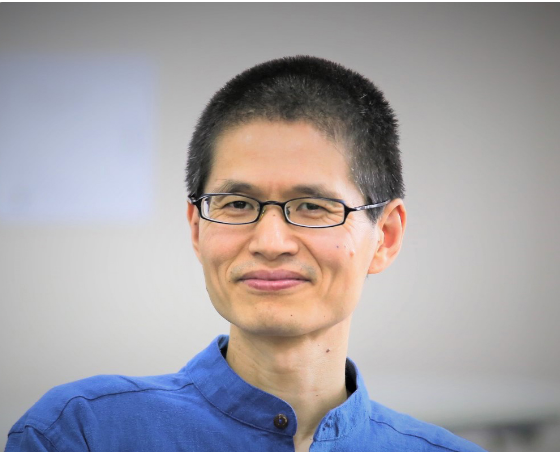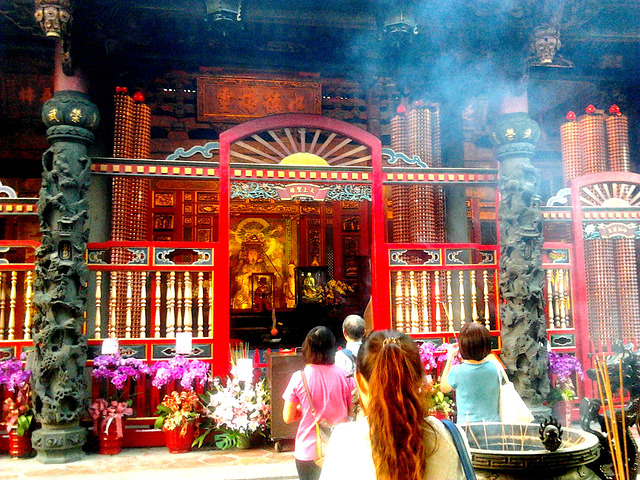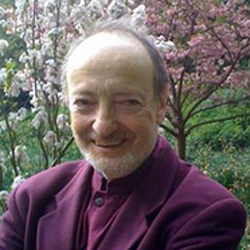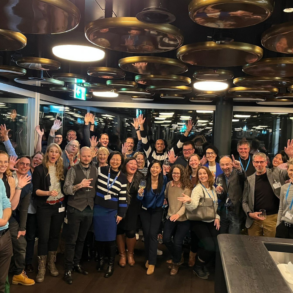By George Pór for Enlivening Edge Magazine
 In the heated preparation for my month-long South East Asia tour in October-November, I had the privilege to meet Weidong Lu, one of the members of the design team of the Second China Organizational Evolution Forum taking place in Shanghai at the beginning of November this year.
In the heated preparation for my month-long South East Asia tour in October-November, I had the privilege to meet Weidong Lu, one of the members of the design team of the Second China Organizational Evolution Forum taking place in Shanghai at the beginning of November this year.
I met Weidong in London. His personal aura and dedication to organizing an enthusiastic Teal community in China immediately ignited my curiosity about the dimensions and possibilities of the development of the international Teal movement enhanced with a strong Chinese presence, intertwined with a deep understanding of the nation’s ancient wisdom traditions.
George: I am so happy that you could make time for this interview! I am intrigued how you discovered Reinventing Organizations by Frederic Laloux and what had happened in your life before, that guided you towards this direction?
Weidong: Thank you, George! When I read the English version in 2015, I became ecstatic! Previously I had been working for a multinational company and also for a state-owned company in China, so I acquired years of work experience at big organizations. Frankly speaking, at one point in my career, even though I was still passionate about what I was doing, deep down I felt very dry and also tired of constantly speaking of business and how to make more money; I became less and less satisfied with business life and also with myself.
I took a bold step and left it all behind for a few years. I studied traditional Chinese culture and I dedicated almost two years of my life to meditative practices from a number of lineages. I am still very passionate about meditation. I became a freelance mindfulness trainer or mindful leadership coach. This way, I am independent from organizations, which makes me satisfied. I could not step back into an organization as an employee anymore.
George: Do you think that mindfulness training, apart from its obvious result of helping individual employees cope better in the work environment, also has an impact on the overall culture of the company?
Weidong: Definitely, if a company leader is also a practitioner. Actually, a mindful leader can nurture his leadership through more authenticity and awareness. Through his presence, he can influence the culture of his team or organization and the relationship with his employees in a very subtle way.
Not until I read the English version of Reinventing Organizations did I realize that creating a different organizational culture is great but not enough. The thoughts of Laloux are very solid and totally revolutionary compared to anything I had learnt before in business school.
That’s when I decided that I wanted other people to enjoy this kind of meaningful work life so my mission became the translation of the book and its publication in China.
I had been involved with other translations before so it was not difficult to find the right publishing hall. I did not have the energy to take on such a major project on my own, so we tried ‘crowd-translation’ with the contribution of 30-35 translators and it worked out fine.
George: What was the reception of the Chinese edition?
Weidong: Actually, I don’t have representative figures, however, I personally know a number of big companies in China, like Alibaba, and all of them have at least a copy within the organization. I receive numerous messages expressing their excitement over the book, and their gratitude for the Chinese translation.
They feel that they are finally not alone in their quest for meaningful and soulful organizational life, and they feel empowered to make a difference within their organization.
George: Are there any readers’ groups, where people come together to discuss the content, like in a community or practice, or study circle?
Weidong: This has all happened in a very simultaneous or emergent way. Some of my friends and I organize a small community of around 200 people, most of them work for companies, some of them freelancers, and they are all very passionate about the new direction.
Most of the gatherings happen in virtual space, and we have some discussions and sharing circles. There are also many self-organized learning groups around the book, and a number of freelancers organizing their own workshops and trainings inspired by Laloux’s book.
George: The three breakthroughs of Reinventing Organizations can also be applied to reinvent one’s self. It’s about stages of consciousness. It applies not only to organizations but also to individuals.
Weidong: Yes, it is very important. I would even say essential for all participants: coaches, freelancers, practitioners and leaders. They all try to implement this direction within their organizations.
George: If you think about your friends or the people you personally know, who have also read the book, approximately what percentage of them is also engaged in the inner journey?
Weidong: It’s difficult to figure out the percentage,
but my observation is that those who are deeply passionate about this direction are already on the journey of personal development or personal exploration.
We promote books to our community related to post-post modern adult development theories such as Ken Wilber, or Robert Kegan’s works. This is why we are launching psychological courses in Shanghai based on these breakthrough theories.
George: Weidong, what lead you from the publication of the book, to the first China conference of evolutionary organizations?
Weidong: The book created a strong community, which needs further ignition to keep up the passion and also to consciously promote these new practices. Last year one of my friends, who had just returned from a European Holacracy forum, gave me the idea of organizing something similar in China. For last year’s forum, we invited many speakers from the West to talk about Holacracy and adult development theories and also representatives of Chinese businesses, such as Alibaba.
George: What’s the purpose of the forum this year?
Weidong: Similar and this year we will have more local companies, who are on the same path now, and we are trying to bring them together, hence, the forum will serve as a showcase to next-stage expertise and practices. I expect the forum to have a ripple effect with a multitude of meetings, gatherings, and vibrant exchanges organizing around it.
George: What do you see as the evolutionary purpose, the highest potential of the forum? What could be the greatest gift of the forum to the development of consciousness culture in China?
Weidong: My personal drive is to help individuals and organizations evolve. Another subtle purpose manifesting through the evolution of individuals and organizations is the evolution of our society.
The purpose for me is to let the individuals and organizations search or really think about the meaning of life.
I think this kind of practice can really help the whole society to evolve in certain ways. I am aware that it will not happen overnight. It will happen through every forum, every new community, new client work, and new translation. They are just little stones in the water, but they have ripple effect.
George: Do you think that China has long-term evolutionary purpose for its people and for its global presence, or is it looking to discover that purpose? China’s wisdom traditions stretch back thousands of years. In those traditions future is long-term, a few decades.
Weidong: Due to the history of the past hundred years, traditional Chinese culture is only recovering from its numbness and more and more people dedicate their time to rediscover and study the ancient wisdom practices. I do hope these people will nurture these practices and merge into new ones, which are very close to Taoism.
Lao Tzu and Frederic Laloux are very similar to each other. Taoism is also very ecology-oriented and encourages autonomy.
 George: In Teal consciousness, there is a lot of emphasis on observing and honouring the flow. There’s another name for Teal, which is flex-flow. Flexible flows. There is also the practice of sense and respond, rather than making big blueprints and long-term strategic plans. These characteristics also resemble Taoism.
George: In Teal consciousness, there is a lot of emphasis on observing and honouring the flow. There’s another name for Teal, which is flex-flow. Flexible flows. There is also the practice of sense and respond, rather than making big blueprints and long-term strategic plans. These characteristics also resemble Taoism.
Weidong: At this point the focus of my consciousness is not on Chinese wisdom but rather a general sense of awareness and mindfulness, which is a kind of self-care through certain psychological, mindfulness, non-violent communication practices to discover deeper layers of myself, to recognize commonalities of human nature, and to develop a respect for autonomy.
These are all essential, in order to find the real meaning and purpose in life and our place in society. In this sense, these practices are from the west. In Reinventing Organizations the case studies are all examples of western culture, however, nowadays most Chinese people can relate to them.
The general mindset of Chinese people is very close to the western way of thinking, due to a shift in our educational system.
Once the Teal practice starts sinking in, maybe it will be easier to explore deeper connections with ancient wisdom traditions.
George: Could you say a few words on the design of the Second China Organizational Evolution Forum this November that would attract Western participants who are dedicated to next-stage development, to a conference in China? How will they have the chance to experience their wholeness during the event?
Weidong: The main part for this forum is keynote speakers and also certain workshops with outstanding facilitators.
This time, we are delighted to have Frederic Laloux amongst us.
James Priest, the founder of Sociocracy, and John Bunch, the Holacracy leader for Zappos are also contributing to the event. We have a guest from Buurtzorg, Holland, and also invited their Asia business leader to share his insights with us.
Several Chinese business leaders have also accepted our invitation, and we have some guests who will introduce some potential practices in Blockchain.
We will, of course, have you there as well, George, to introduce us to the realms of Transformative Communities of Practice. You are a genuine role model for the Chinese participants: your personal presence, your passion and dedication to evolutionary development. Your authenticity, which shines through your personal life journey, serves as a rich resource for practitioners who are on the way.
The authenticity of our speakers and facilitators will bring a different kind of energy to the forum. I believe that most people will be able to sense into this difference. The timeframe of two days is tight, and we still try to achieve spaciousness through reflection practices, music, and art programmes.
To start, we will have two facilitators from the Toscane Accompagnement inviting all participants to connect with themselves, with the people around them, and with the whole field. With the help of Toscane practice and the keynote presence of Frederic Laloux the whole forum can start from a much deeper place.
George: A very exciting program. I am very delighted that I can be there, and looking forward very much to meeting you again in person, this time in your town. I do hope that I can contribute to the exchanges of views between China and the west, and that many of our readers will engage and decide to come to Shanghai and experience the awakening of the new management paradigm in the most populous country of the world.

George Pór is an evolutionary thinker and a strategic learning partner to visionary leaders in business, government, and civil society. He is the originator of Enlivening Edge, serves on the faculty of Meridian University, and is founder of Community Intelligence. A select list of his articles and book chapters on the fields of collective intelligence, organizational and social renewal can be found here.





Small correction. James Priest is the founder of the company Sociocracy 3.0, not sociocracy it self.
Thank you, Jacob, for the correction. Well taken.